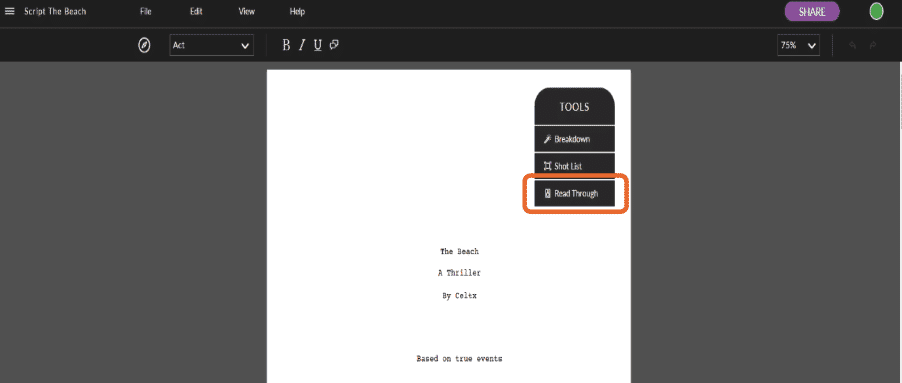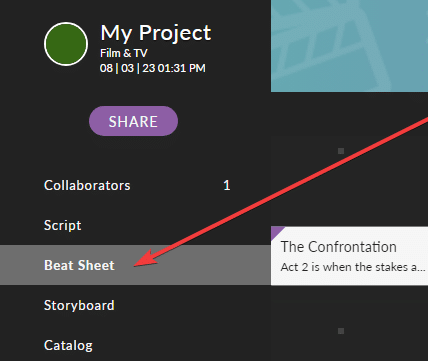![What is a spec script? [the full guide]](https://m8p8v8q3.delivery.rocketcdn.me/wp-content/uploads/2024/04/what-is-a-spec-script-1024x576.png)
If your goal is to become a screenwriter, there’s one word you’re guaranteed to hear early and often: spec.
Short for ‘speculative’, a spec script is the foundation for many Hollywood careers. It’s the script you write not because someone asked for it, but because you believe in the story. It’s essential you understand what a spec script is, and how to write a great one if you’re looking to break into film or television.
So, in today’s blog, we’ll be taking a journey through the world of spec scripts, covering everything from definitions and formatting tips to some of the best examples of spec scripts the industry has to offer. Plus, we’ll look at how tools like Celtx can help bring your story to life.
Ready? Let’s go…
In This Article:
- What is a Spec Script?
- How are Spec Scripts Used in the Industry?
- Film vs TV Spec Scripts | What’s the Difference?
- What Makes a Great Spec?
- Spec Scripts with Celtx
- Examples of Successful Spec Scripts
- Conclusion
What is a Spec Script?
A spec script (short for ‘speculative screenplay’) is written on speculation.
This means the writer isn’t hired or paid in advance to write it. Instead, the writer hopes to sell the script or use it as a sample to land assignments or representation. Spec scripts are different to commissioned scripts, which are developed for specific studios or producers. They are original works created at the writer’s initiative, showcasing their voice, creativity and understanding of the storytelling craft including structure and dialogue.

Spec scripts will usually fall into two categories:
- Original feature scripts
- Spec TV scripts (a pilot or an episode of an existing series)
In short, a spec script is a writer’s first foot in the door when trying to break into Hollywood or make an impression on agents and executives.
How are Spec Scripts Used in the Industry?
Spec scripts play multiple roles in film and television. While only a small percentage will be sold or produced, they are still a critical tool for launching writing careers.
Here are four ways spec scripts are key within the industry:
1. Samples to Gain Representation
Agents and managers will often read spec scripts to determine if a writer has marketable talent. A strong spec script can help you sign with a literary agent or manager who will then help you navigate your career.
2. Samples to Land Writing Assignments
Many professional writers are hired to rewrite, adapt, or develop other projects. To determine which writers will best suit their projects, producers and executives will often ask to read spec scripts to gauge this, alongside a writer’s ability.
3. To Sell the Script
This is less common, but a spec script can of course be sold outright. If the concept is high enough and the writing is strong, producers or studios might option or purchase the script. A lot of time, this is a case of being in the right place at the right time with the right people.

4. Samples to Break into TV Writing
In television, a spec script can be used to either apply for writing fellowships or to be staffed on a show. Even if your spec isn’t meant to be produced, it shows you can mimic the voice and structure of an existing series and slot right in.
Film vs TV Spec Scripts | What’s the Difference?
Yes, spec scripts can have slightly different uses depending on whether they’re for film or TV.
Now, let’s dive deeper into those differences:
Film Spec Scripts
A film spec script is a feature-length screenplay written in the hopes of being purchased and produced. These will usually be original and complete scripts meant to show you can craft a killer story from start to finish.
Let’s look at the facts:
- Film specs are usually 90-120 pages in length.
- They are usually written using the three-act structure.
- Submitted to producers, agents, contests, or pitched directly

TV Spec Scripts
There are two types of TV spec scripts: a spec episode which is an episode of an existing series written in the style and voice of the show, or an original pilot which is a brand-new concept for a show, including original characters, tone, and plot.
Here are the facts:
- TV comedies are usually 22-35 pages in length.
- TV dramas are usually 45-65 pages in length.
- Their structure is usually based on a network format with act breaks and cold opens.
- TV specs are used for fellowship submissions, pitch materials and staffing samples.
What Makes a Great Spec?
We know you’re here for one thing, to get to know all the tips for writing the best script you can! Well, your patience shall be rewarded. Here are our top five tips for writing a professional, polished, and emotionally engaging spec script!
1. Start with a Strong Concept
A great concept is one you can easily pitch in one or two sentences. Make sure it’s clear, unique and relatable.
Think The Curious Case of Benjamin Button: “A man ages in reverse from old to young” or Breaking Bad (2008-2013): “A high school chemistry teacher becomes a meth kingpin”.

2. Structure is Key
Use traditional story structure to keep the audience engaged. The most common is the three-act structure:
- Act One sets up the story and gives us our inciting incident.
- Act Two provides the rising tension and midpoint twist.
- Act Three is the climax and resolution, concluding the story.
For TV, follow the act break format typical of the show you’re making. This will usually be the five-act structure.
While it can be tempting to play around with structure, we don’t advise it if you’re in the early stages of your writing career. Once you know the rules and are confident with how you want to break them, then go ahead. Until then, a clear three or five act structure is the way to go!
3. Let the Characters Drive Your Writing
Your characters should be complex, goal-oriented, and undergo change over the course of the story. To do this give your characters clear desires, create stakes and conflict for them to overcome, and let them make choices that have clear consequences that in turn drive the plot forwards.
4. Show Your Voice
With the industry becoming increasingly competitive, showing off your writer voice is more important than ever! Agents and producers are looking for writers with a unique style.
Remember to be bold and creative! Just stay grounded in story logic.

5. Formatting Matters
The increased competitiveness of the industry means that there are more scripts out there! Agents and producers are highly likely to discard your script immediately if it doesn’t adhere to the most basic of guidelines.
Here are those basics:
- 12-point Courier font.
- 1.5” left margin, 1” right, top and bottom margins.
- Scene headings capitalized and presented as: INT./EXT. LOCATION – TIME.
- Action lines written in present tense and are visual and concise.
- Dialogue should be centred with character names in CAPITALS.
Sloppy formatting screams ‘amateur.’ Don’t get caught out!
For more top tips on formatting your screenplays, check out our blog How to Format a Script | A Step-by-Step Guide.
Spec Scripts with Celtx
Our powerful screenwriting software is designed for all writers at all stages of their journeys!
While our entire suite of pre-production tools can see you from the start to the end of your filmmaking process, there are some standout tools that you need to check out if you want to improve your spec scrip workflow!
1. Read Through
Our ‘read through’ feature reads your script aloud using text-to-speech. This helps identify awkward phrasing, pacing issues, or unnatural dialogue.
By hearing your script come to live off the page and hear the words spoken, it’s a lot easier to identify any errors or inconsistencies, such as:
- Spotting awkward phrasing or unnatural dialogue.
- Ensure character voices are distinct.
- Assess the overall rhythm and timing of scenes.
Assign roles to collaborators or use automated voices to get a sense of pacing, dialogue flow, and character dynamics.
To access the Read Through feature on your Celtx dashboard, make sure you have it enabled in your tool list. You may need to toggle this feature on from the ‘View’ menu > ‘Tools’.

2. Beat Sheet
Our beat sheet tool allows you to outline your story visually and ensure your script hits all the key emotional and narrative beats. This is especially helpful in the planning phase!
To access the beat sheet section, simply click on Beat Sheet in the left-hand menu of your Celtx dashboard.

For a full walkthrough on how to use Celtx beat sheets, click here.

3. Auto-Formatting
Celtx automatically formats your script to industry standards as you write to save you precious time. It also ensures your script stays consistent, and you can focus on being your best creative self!
To learn more about how Celtx auto-formatting works, click here.
Ready to get your idea on the page? Click here to try Celtx script writing software for free.
Examples of Successful Spec Scripts
Now you know all there is to know about spec scripts, let’s check out some of Hollywood’s biggest success stories and the writers behind them for some valuable inspiration and manifestation!
American Beauty | Alan Ball
Originally a stage play, writer Alan Ball adapted it into a spec script that was subsequently bought and produced by DreamWorks. It went on to win the Oscar for Best Original Screenplay in 2000.

Good Will Hunting | Matt Damon and Ben Affleck
Originally written as a spec script by then unknown actor Matt Damon during his final year of college, before bringing Ben Affleck on board. The movie went on to win an Academy Award for Best Original Screenplay in 1998 and launched Damon and Affleck’s film careers.

The Good Place | Michael Schur
The pilot script for this hit TV series was an original TV spec script that showed off a fresh premise and deep philosophical themes wrapped in humor.
According to Schur, he developed the concept independently and write the script on speculation before pitching to NBC, who picked it up based on the strength of the idea and the writing.

Breaking Bad | Vince Gilligan
Now, we know it’s obvious by now that we’re huge fans of Breaking Bad here at Celtx and for good reason!
After many years of writing for cult series The X-Files, Vince Gilligan’s original pilot script showcased his knack for complex characters and genre-bending storytelling. The unique selling point of the series was a protagonist becoming an antagonist.
It was Gilligan’s established career and hard work that set him up well for his meetings with Sony Pictures Television, Showtime, and FX, with AMC taking up the mantle for the now groundbreaking series.

Reading successful spec scripts like these is one of the best ways to learn how to write your own! Sites like IMSDb, The Script Lab, and Simply Scripts host dozens of downloadable screenplays.
Conclusion
A spec script is more than just a piece of writing. It’s a declaration of your potential as a storyteller. It says, “This is what I can do.” Whether you’re aiming to sell a feature, get staffed on a show, or simply hone your craft, writing a spec is an essential step in your journey.
With the right tools, strong storytelling fundamentals, and plenty of perseverance, your spec script can be the key that opens industry doors. Tools like Celtx can help you stay organized, polished, and professional every step of the way.
So, what are you waiting for? Start your next screenplay with Celtx! Open that blank page, start outlining your beats, and write the story only you can tell.
Take your idea from concept to compelling spec—get started with Celtx »
Up Next:

How to Write a TV Show Script (A True Beginner’s Guide)
Now that you know what a spec script is, learn how to structure a compelling TV episode from start to finish. This guide breaks down format, pacing, and what makes a script stand out.
